|
|
|
Sort Order |
|
|
|
Items / Page
|
|
|
|
|
|
|
| Srl | Item |
| 1 |
ID:
118961
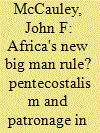

|
|
|
|
|
| Publication |
2013.
|
| Summary/Abstract |
The concept of 'big man rule', conventionally invoked to refer to a kinship-based relationship between patron and client, is now finding application in the charismatic Pentecostal movement in Africa. This article explores why new Pentecostalism emerges as an alternative to traditional clientelism, and how well the analogy of big man rule applies. It traces the Pentecostal form of big man rule to four socio-economic transformations: ongoing weakness in the state's ability to provide social welfare; a change in social values in the wake of the global financial crisis; expanding state control over customary activities; and urbanization. Drawing on data collected from both patrons and clients in Ghana, the article shows that Pentecostalism mirrors traditional big man rule by encouraging members to break from their past, to trust leadership, and to commit exclusively to their religious social network. Among church leaders, Pentecostalism also encourages internal competition and the provision of social services. Most importantly, the movement creates pay-off structures that replicate the exchange of resources for loyalty central to big man rule. The implication is that Pentecostalism's success as an alternative informal institution is not a function of Weberian ethics or occult spiritualities, but rather its ability to fill voids left by the state and to provide new social networks.
|
|
|
|
|
|
|
|
|
|
|
|
|
|
|
|
| 2 |
ID:
184237
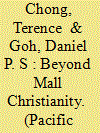

|
|
|
|
|
| Summary/Abstract |
The global spread of Pentecostalism has been facilitated by a combination of transnational impulses and indigenizing interests. In the case of independent Pentecostal megachurches, their growth in urban centres is reflected in both Western and Asian societies. Megachurches in America and Southeast Asia have flourished because of their unique blend of middle-class congregants, appeal to consumerist and popular culture, as well as their compatibility with the urban lifestyle patterns of their congregants. However, it would be a mistake to assume that the drivers of growth and the conditions behind the common features of these megachurches are the same. Examining Jakarta, Surabaya, Kuala Lumpur, and Manila, we show that megachurches are not located in shopping malls and commercial complexes merely for growth purposes or to align with the consumerism ethos of capitalism. Deeply local concerns, such as hostile neighbourhoods dominated by Muslim or Catholic majorities, have led to the camouflaging of Christian symbols in urban settings. The purposeful targeting of youth also reveals the Southeast Asian megachurch engaging with the new urban mobilities triggered by rapid economic development. We conclude that the Southeast Asian city’s structure and layout are being repurposed by Christian innovation and reinterpretation. Christianity in the Southeast Asian city is hidden in plain sight.
|
|
|
|
|
|
|
|
|
|
|
|
|
|
|
|
| 3 |
ID:
168234


|
|
|
|
|
| Summary/Abstract |
Local religions, Islam and Christianity influence and shape West African livelihoods where for many spirituality is an integral part of work, time and making a living. For farmers the spiritual imbues their understanding of the natural world, as well as affecting the control and allocation of resources and their timely use. For the Sufist Mouride brotherhood of Senegal their work ethic nurtures agriculture and supports a diaspora of petty traders and businesses. Meanwhile, the Christian Pentecostal Church encourages myriad small businesses, and its promotion of a work ethic that has occasioned the contention of a Weberian-style transformation. The creation of sustainable networks of socio-economic change through religious adherence is not in doubt, but whether this will promote a general developmental shift is more contentious. Pentecostals emphasize education and literacy, a priority for most governments, but without job opportunities there is widespread discontent among the young, even the educated. Furthermore, the young are disenchanted by patrimonial-clientelist societies, and it is through religion that violent dissent is articulated. Assertions that religion per se is inimical to social and economic change in West Africa are difficult to substantiate. What is a problem for farmers and small businesses is the uncertainty not just of their immediate environments, but of the volatility and dysfunctional nature of the state, and a lack of enabling conditions. Thus, religion and spirituality provide help in difficult times for people, but also opportunities for improvement in their livelihoods and lifestyles.
|
|
|
|
|
|
|
|
|
|
|
|
|
|
|
|
| 4 |
ID:
130830
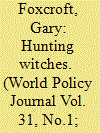

|
|
|
| 5 |
ID:
119878


|
|
|
|
|
| Publication |
2013.
|
| Summary/Abstract |
Barcelona-Los Pentecostales de Barcelona is located on a nondescript street near the city's convention center. Twenty minutes before the evening service, the sounds of prayer and soft singing waft down from the second floor sanctuary. The lights have been dimmed, and some two dozen congregants are scattered throughout the large room, some on their hands and knees whispering prayers at their seats. Others hold hands in small groups and sing joyously.
|
|
|
|
|
|
|
|
|
|
|
|
|
|
|
|
| 6 |
ID:
157194
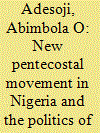

|
|
|
|
|
| Summary/Abstract |
The Pentecostal Movement in Nigeria, like elsewhere, is a distinctly Christian organization by virtue of what it professes and what characterizes it. Increased privileges for leaders, leadership visibility and leadership style have tended to encourage other aspirants to form similar organizations. Despite the existence of an umbrella association like the Pentecostal Fellowship of Nigeria, different centres have emerged, each seeking relevance and influence. Using historical and sociological approaches, this paper discusses the trends in the New Pentecostal Movement in Nigeria, identifies some characteristic types and probes into the basis for belonging, seeking to belong or otherwise. It also interrogates the strategies employed and its effectiveness or otherwise.
|
|
|
|
|
|
|
|
|
|
|
|
|
|
|
|
| 7 |
ID:
189703


|
|
|
|
|
| Summary/Abstract |
Guatemala is the most Protestant country in Latin America, with a rising population of Pentecostals. Although evangelicals have had substantial social and political influence for decades—one of them was a military dictator at the height of the country’s civil war in the early 1980s, and was later tried for genocide—many remain ambivalent about direct engagement with secular power. Instead, evangelical groups have been active in addressing gaps left by the state in a society struggling with violence, in areas such as education, social services, and security.
|
|
|
|
|
|
|
|
|
|
|
|
|
|
|
|
| 8 |
ID:
124260
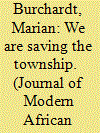

|
|
|
|
|
| Publication |
2013.
|
| Summary/Abstract |
In this article, I trace the emergence of Pentecostal FBOs in the South African city of Cape Town. By focusing on their involvements in HIV/AIDS programmes, including practices such as health education, counselling and material support, I analyse the organisational dynamics and consequences ensuing from their activities. Pentecostal involvements in development work engender complex connections between two distinct processes: On the one hand, they offer Pentecostal communities new social spaces for promoting their faith and moral agendas. On the other hand, development work urges Pentecostal communities to recast their activities in the logic of formal organisation and accountability (proposals-grants-projects). On the ground, these logics are constantly subverted as beneficiaries construe FBOs as patrons and deploy Pentecostal identities for mediating access to FBOs and the resources they command. My argument is that Pentecostal faith works to mediate the entire set of social relationships, expectations, imageries and practices that structure FBO work on the ground. More than belief and ritual, it is Pentecostal belonging that links organisations, people, opportunities and resources.
|
|
|
|
|
|
|
|
|
|
|
|
|
|
|
|
|
|
|
|
|